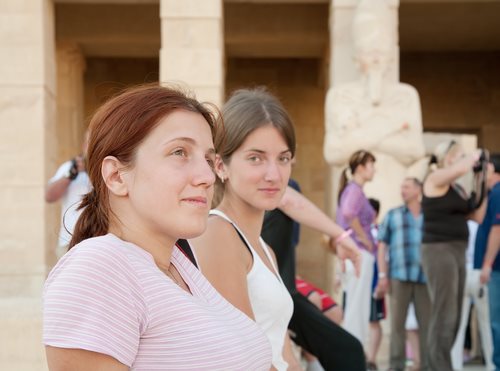
Women’s Rights Groups Unhappy With New Egyptian Constitution
Egypt’s new constitution has been the subject of intense debate and controversy, with many women’s rights groups expressing their dissatisfaction with the lack of adequate protections for women. The constitution, which was approved in a national referendum in April 2019, has been widely criticized for rolling back many of the gains that women have made in recent years. This article provides a comprehensive overview of the concerns and criticisms of women’s rights groups in Egypt.
Background
Egypt’s history of gender inequality predates the current government. For years, women have been excluded from many sectors of society, including politics, education, and the workforce. Women’s rights groups have been actively advocating for women’s rights and gender equality for decades, and have made significant strides in recent years. However, the current government’s policy changes threaten to reverse these gains.
Criticisms of the New Constitution
The new constitution has drawn significant criticism from women’s rights groups for several reasons. These include:
No Explicit Protection for Women’s Rights: The constitution does not provide explicit protections for women’s rights, which could be used to protect women from discrimination.
Removal of Equal Opportunities Clause: The new constitution removes a provision that mandated the state to ensure equal opportunities for all citizens regardless of gender, religion, or race.
Nationality Law Changes: The constitution allows Egyptian men married to foreigners to pass on their nationality to their children, but requires women to first obtain approval from a high-ranking official to pass on citizenship to their children.
Marriage and Divorce Laws: The new constitution gives religious clerics the power to oversee marriage and divorce laws, which could result in discriminatory laws that disadvantage women.
Implementation Challenges: Women’s rights groups have also expressed concerns that, even if the protections for women were in the new constitution, the implementation could be difficult due to the lack of political will, corruption, and outdated societal norms.
Consequences of Inaction
The consequences of inaction on women’s rights could be severe. Women constitute nearly half of Egypt’s population, and any policies or laws that limit their rights could have rippling effects on the entire nation’s economy, political stability, and societal development. The gender-based discrimination could lead to a larger wealth gap and access gaps in education, healthcare, and opportunities.
Conclusion
The new constitution in Egypt has been a significant setback for the women’s rights movement in the country. Women’s rights groups have voiced their disagreement with various aspects of the new constitution, which threatens to hinder the progress that has been made towards gender equality in recent years. The implementation of policies to combat gender inequality and increase women’s rights could lead to a more prosperous and developed Egypt for everyone. Therefore, it is crucial that efforts for gender equity and protection of women are not only supported but widely promoted and enforced throughout Egypt.
According to Amnesty International, women’s rights and people advocating for minority religious groups in Egypt are unhappy with a new proposed constitution. The new laws, if enacted, would significantly limit freedoms in the country, which has recently been torn apart by revolution and uncertainty about what form the new government should take.
One of the biggest changes that some women’s rights groups wanted to see was an end to child labor. However, many opposition political parties that were opposed to rules for the new governing assembly of Egypt boycotted the assembly to draft a constitution. The leaders of those parties claim that the assembly is not representative of Egyptian society, and say that the people of Egypt will not accept the constitution in its current form.
Only seven women were part of the new 100 seat Egyptian assembly when it started. However, after protests led to even more parties boycotting the assembly, most women have left the assembly. According to the United Nations and Amnesty International, women are discussed only in the context of home and the family.
A State Department spokesperson in the United States said in a press statement that the proposed constitutional changes “raise concerns for many Egyptians and for the international community.” The White House has so far refused to intervene on behalf of the groups who feel they have been unfairly treated by the new proposals.
In addition to women’s rights groups, a number of minority faiths are upset over a provision that allows for only three religious faiths in Egypt: Muslim, Christian, and Jewish. Other religious groups, including the Baha’i, are excluded from the list of approved religions, and the constitution may also prohibit some types of Muslim practice.
One of the reasons these constitutional changes have been so unwelcome for many Egyptians is that the “Arab Spring” uprisings that gave rise to the new governmental negotiations was largely caused by groups who felt that the nation had not done enough to protect human rights. The new constitution also continues to allow trying civilians in military courts, a practice vehemently opposed to many who participated in the Arab Spring revolts.
The one bright spot for women in the new constitutional changes is that a provision forcing women’s issues to be decided solely on the basis of Islamic law was discarded. Excitement over the removal of this provision was short-lived, however, as Egyptian women discovered the new draft had also removed protections for discrimination on the basis of sex that had been proposed in earlier drafts.
According to the U.S. State Department, the “constitutional vacuum” in Egypt has created instability that “can only be resolved by the adoption of a constitution that … respects fundamental freedoms, individual rights, and the rule of law consistent with Egypt’s international commitments.” The State Department encouraged Egyptian leaders to meet with opposition leaders to come to an agreement among all parties.
Sources: amnesty.org, un.org, state.gov


































